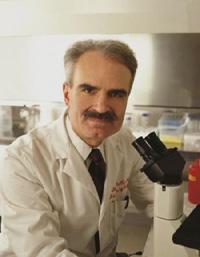
September 14, 2011 — The National Heart, Lung and Blood Institute (NHLBI) of the National Institutes of Health (NIH) has awarded a $12.8 million program project grant to Roberto Bolli, M.D., for five years. Originally funded at $11.7 million in 2006, the project, titled “Protection of Ischemic Myocardium” involves research with adult stem cells in four areas:
- Investigating how the introduction of genes into stem cells might improve stem cell therapies
- Looking at how diabetes affects stem cells
- Looking at how a class of proteins — cytokines — affect stem cells during heart failure
- Investigating the signaling pathways of stem cells in the body
Bolli’s second groundbreaking study, “Cardiac Stem Cell Infusion in Patients with Ischemic Cardiomyopathy,” looks to use a patient's own cardiac stem cells to regenerate dead heart muscle after a heart attack.
His team of researchers at the University of Louisville and Jewish Hospital are collaborating with a team led by Piero Anversa, M.D., at the Brigham and Women's Hospital in Boston. Treatment in the SCIPIO trial isolates cardiac stem cells from part of the upper chamber of the heart (harvested during coronary bypass surgery) and expands these cells in the lab.
Four months after surgery, the cells are infused into scarred cardiac tissue by way of catheterizing a large artery in the patient's leg. Using the patient's own cardiac stem cells eliminates the possibility of rejection.
While it is not yet known exactly how the processed cells work, it is thought that they could be regenerating heart muscle. Regardless of the mechanism of action, the 15 patients currently in Bolli’s Phase I clinical trial all have shown improvement.
Those improvements include increased ejection fraction, the amount of blood pumped through the two lower chambers of the heart. Patients also have experienced dramatic improvements in what they are able do physically, Bolli said. “There are people who are almost completely incapacitated, and after they get a stem cell infusion, they can do so much more.”
Before his procedure, Mike Jones tired quickly when he tossed a football with his granddaughter. “I couldn’t pass more than three or four times without it bothering me,” he said. “After the stem-cell infusion however, I could do the treadmill for 30 minutes at 3-3.5 miles an hour with a one-degree grade. It’s most definitely the stem cells; I can do about anything I want now.”
Jim Dearing concurs. “I’m walking every day now. I tell everyone I meet about this. Maybe someday it can help rejuvenate hearts.”
Bolli is also director of the Institute of Molecular Cardiology and chief of the division of cardiovascular medicine in the department of medicine at Louisville. He has made it his mission to make adult stem cell treatment an option for all who must cope with the limitations of a failing heart.
“It is entirely unacceptable that heart failure affects roughly 6 million Americans, yet treatment consists of either a heart transplant or the insertion of mechanical devices that assist the heart,” he said. “All of these other treatments currently available – transplants, assist devices, drugs – may prolong life but do not address the root cause of failing heart muscle. By regenerating new heart muscle, cardiac stem cells could actually solve the problem.”
This grant application was the number one application nationwide in scoring by the NHLBI, going up against top universities in the country including Ivy League institutions. The overall score of the Louisville application was the highest possible – a “10” – and each of the four component projects earned individual scores of “10.”
An overall score of 10 is extraordinarily rare and NIH staff report to Bolli they do not know of any other grant receiving scores of 10 for each project within it.
Bolli and his team have brought to U of L more than $100 million in NIH grants since his arrival in Louisville in 1994.
At the same time, patients in another clinical trial conducted by Bolli and his research team have reached the important two-year mark following the research procedure performed on them.
Mike Jones and Jim Dearing, both of Louisville, were the first two patients infused with their own processed adult stem cells in Bolli’s SCIPIO trial. Three more – William Williams, William Covey and Roger Wilson – followed, and as of Oct. 9, all will have reached their endpoint in the trial.


 January 05, 2026
January 05, 2026 









